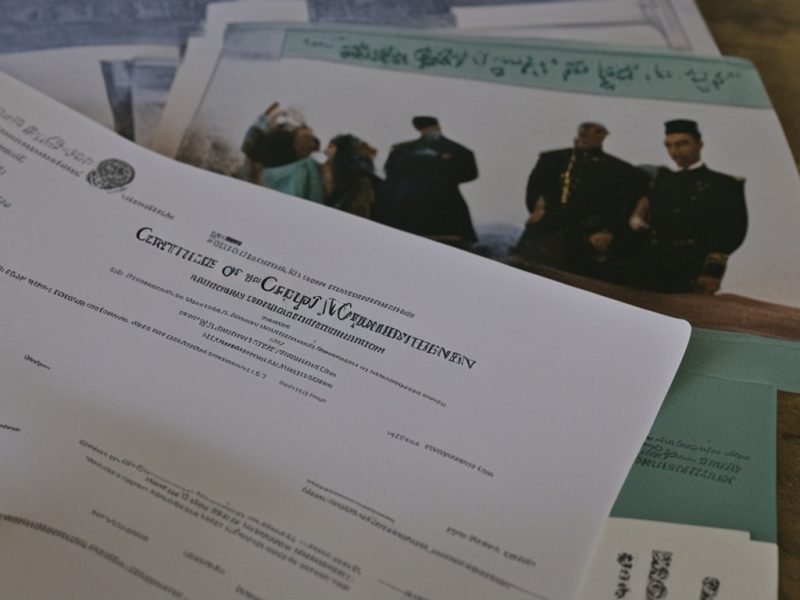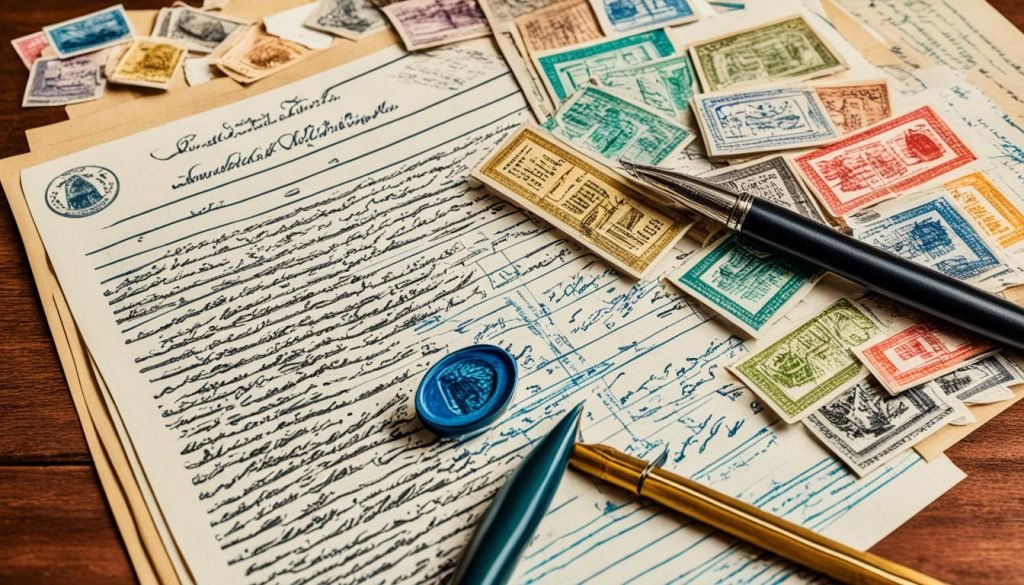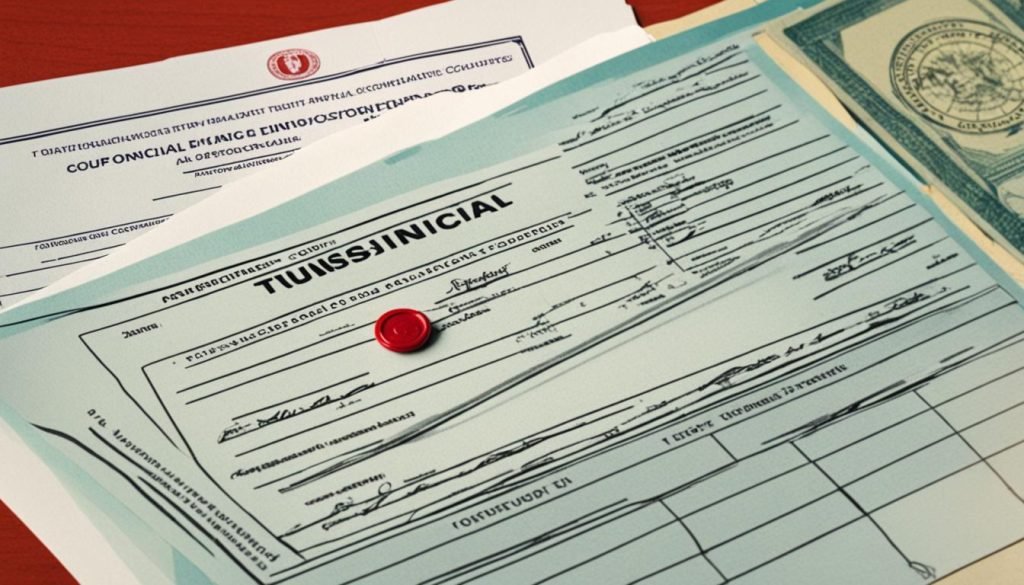

Every year, over 150 British people marry in Tunisia. If you’re one of them, getting the right papers is key. You’ll need several important documents for a smooth wedding. This includes a no marriage ban certificate from the UK, a passport, and proof of where you live. The British consulate can help by witnessing signatures and making certified copies.
The consulate offers many helpful services. They guide you to get things notarised locally whenever possible. They can’t make your documents but can certify ones you’ve prepared. Knowing what’s needed makes the marriage process easier. This avoids delays.
Learning what you need for a wedding in Tunisia is very important. We will explore key points like laws, age, and the role of the City Hall. These details are essential for couples planning to marry.
Marriage laws in Tunisia are based on Law No. 57 from August 1, 1957. Your marriage needs to happen in front of a Notary at City Hall to be legal. When a foreigner is involved, the rules might change a bit. All parties must bring certain documents to get married.
The legal age to marry in Tunisia is 18 for males and 17 for females. Both people must agree to the marriage. If under these ages, they need their parents’ written okay. Knowing these rules helps you follow local laws.
The City Hall is where marriages become official in Tunisia. It checks all weddings are legally done. Couples don’t have to live there for a set time or tell the public before marrying. But they must complete a health check two months before the wedding. This check looks for any serious illnesses.
Religious weddings can happen after the legal one but are not a must. These events are more about tradition than law. Only the City Hall registry makes a marriage legal.
Getting an affidavit of eligibility to marry is key for foreigners planning to wed in Tunisia. This document proves one’s legal ability to marry. It ensures the marriage will be seen as valid.
The affidavit of eligibility to marry is very important. It is especially so for those from the UK and the US. This affidavit shows someone is free to marry and meets all legal needs. It is a must-have document for marrying in Tunisia.
Getting this important document requires making a promise in person. For Brits, the British Embassy in Tunis offers help. Americans should visit the U.S. Embassy in Tunisia. One must explain why they need the affidavit and book a meeting.
Meetings are usually on weekdays. Remember to book ahead to follow embassy rules.
A birth certificate is key for getting married in Tunisia. It checks the identities of those getting married. It also confirms personal details needed for the wedding.
Your birth certificate must have the official seal for marriage in Tunisia. If you’re not from Tunisia, your birth certificate needs translating. It must be in Arabic or French by a sworn translator. This ensures all details are right and accepted in Tunisia.
You can get certified copies from where your birth certificate was issued. Then, make sure these are certified by your embassy in Tunisia. This step checks the birth certificate’s truthfulness for marriage. It also shows it’s valid for Tunisian marriage documents.
Planning to marry in Tunisia? You must bring a valid passport. It proves who you are and is key for paperwork. Both people getting married need to show passports. This meets the passport requirement for Tunisian marriage. It also helps with other steps.
A valid passport is very important for embassy services too. Say you need a copy of your British passport certified. You have to bring your actual passport and where you live proof to the British Embassy. Without them, it’s hard to get what you need.
Here’s why each ID is important for the passport requirement for Tunisian marriage:
| Document | Purpose |
|---|---|
| Passport | Acts as primary proof of identity and nationality. |
| Proof of Address | Validates one’s residency status for notarial services. |
Before marrying in Tunisia, you need a prenuptial medical certificate. It proves both people are healthy for marriage. It checks they are free from contagious diseases, addiction problems, and mental issues.
In Tunisia, a prenuptial medical certificate is a must-have. It shows both people wanting to marry passed a medical check. It looks for infectious diseases, alcohol problems, and mental health conditions.
To get this certificate in Tunisia, go to a doctor. The doctor does the medical exam. You get a form from the local city hall to help the doctor check everything needed.
The medical exam should be thorough and recent, not older than two months by the wedding date. This makes sure the information is up to date for the marriage. It looks deeply into any infectious diseases and checks the physical and mental health of both individuals.
| Requirement | Description |
|---|---|
| Infectious Diseases Screening | Checks for the presence of contagious illnesses ensuring neither party poses a health risk. |
| Alcoholism Evaluation | Assesses for issues related to alcohol consumption that might adversely affect marital life. |
| Mental Health Assessment | Ensures both individuals are mentally fit to enter into a marriage. |
| Validity Period | The certificate is valid for up to two months from the date of the medical examination. |
Planning to remarry in Tunisia needs certain legal documents for remarriage in Tunisia. These documents show your last marriage has officially ended. This is important.
Previously married? You must show a final divorce decree. It must be approved in your country. Also, it needs translation to Arabic or French and official stamps. This makes getting legal documents for remarriage in Tunisia smoother.
If a spouse has passed away, their death certificate is needed. Like divorce decrees, it must be translated and stamped. These are kept with Tunisian Civil files. They make sure everything is legal and real.
When planning a wedding in Tunisia, you’ll need some supporting documents for marriage in Tunisia. These help along with key documents like birth certificates and passports. Let’s look at the extra papers you should have ready.
For supporting documents for marriage in Tunisia, proof of address is needed. This can be:
These help show where you live. They are key to finishing your marriage forms.
For young couples in Tunisia, supporting documents for marriage in Tunisia include parental consent. If you’re under 20, your parents must agree in writing. Make sure to fill out and submit all forms properly.
If you want to get married in Tunisia, you must prepare your documents well. If they’re not in Arabic or French, you need them translated. A sworn translator can do this. Then, a notary must check them to make sure they’re okay.

Documents need translating to meet Tunisia’s laws. A sworn translator must do this task. They make sure your papers, like birth certificates, are accepted in Tunisia.
After translating, you must notarise the documents for marriage. This makes them officially accepted. You can use local notaries or, if you’re British, embassy services.
| Service Type | Local Authority | British Embassy |
|---|---|---|
| Certified Translation | Sworn Translator | – |
| Notarisation | Local Notary | Consular Office |
Planning a wedding in Tunisia? You’ll need some important papers. These documents make sure your marriage is legal. Here’s a list of what you should get ready:
Next to these essential documents for marriage in Tunisia, make sure all your translations are official. Also, all your papers need to be properly stamped. Work closely with local officials and your embassy in Tunisia. They can tell you if there’s anything else you need. Getting everything ready will help your marriage be accepted legally.
Booking a time for consular marriage in Tunisia needs planning and understanding. You’ll find how to set an appointment, what papers to bring, and fees needed below.
Firstly, you must book early at the British Embassy in Tunisia. They’re open on Monday, Tuesday, Thursday, and Friday mornings but closed on Wednesdays. Book online or directly via phone or email. Picking a suitable time is important as it affects your service needs.
After booking, you need several key documents. For marriage, you should bring:
Having all documents ready makes your visit smooth.
Knowing the fees for services at the British Embassy is crucial. Fees can be paid by card or cash in local money. Here’s a breakdown of some charges:
| Service | Fee |
|---|---|
| Notarial and Documentary Services | Vary based on document type |
| Administering an Oath | Specific fees listed at the embassy |
| Affidavit or Affirmation | Includes administration costs |
Being informed means no surprises at your appointment. Proper planning makes your consular appointment smoother and quicker.
Planning your wedding in Tunisia takes key steps for a smooth, lawful day. Picking the perfect venue and making it official at City Hall is a must. Planning wisely is key.
Finding the right venue in Tunisia is crucial and needs research. You can pick from historic sites, luxury hotels, or beautiful coastal spots. Tunisia has lots to offer. It’s smart to visit places first to make sure they fit your dreams and guest list.
Legally registering your wedding at the City Hall is vital. It makes your marriage official. Book an appointment at City Hall and get your paperwork ready. Make sure to confirm your appointment early to dodge any last-minute issues.
After the civil registration, some choose a religious ceremony. It honors traditions and beliefs. Talk with your place of worship to sync with your civil ceremony. Though not required, it adds depth to your day, mixing legal and spiritual pledges.
After your wedding in Tunisia, you must legalise your marriage papers to use them abroad. This makes sure they are accepted in other countries.

This step checks the signs and seals on your papers are real. It shows foreign places they can trust your documents.
In the UK, go to the UK Legalisation Office with your documents. They will make them officially usable in the UK.
The cost to legalise documents varies. Always check the latest fees to avoid surprises. Proper legalisation prevents future problems.
Here’s what you might pay:
| Service | Expected Cost |
|---|---|
| Document Verification | £30 |
| Legalisation Processing | £35 |
| Additional Copies | £15 each |
Legalising your Tunisian marriage documents is key. Knowing the costs helps you prepare for legal needs in other countries.
Getting married in Tunisia takes careful planning. You must prepare well. The checklist of needed papers can look scary. But if you follow it step by step, everything will go smoothly. You’ll need to do health checks and collect important papers, like birth certificates and passports.
One important thing I learned was booking appointments at embassies, like the British embassy. This step makes sure your documents are accepted in Tunisia and other countries. You will also need to get documents translated into Arabic or French. Then, they must be officially stamped.
Knowing the list of documents for a Tunisia wedding helps a lot. If you plan carefully and understand the legal needs, it makes things easier. Good planning helps avoid problems. This way, your wedding in Tunisia will be happy and legal.
To marry in Tunisia, you’ll need a few important papers. These include your birth certificate and passport. You’ll also need an affidavit of eligibility, prenuptial medical certificate, and proof of address. If you were married before, bring a divorce decree or death certificate of your former spouse.
In Tunisia, Law No. 57 sets marriage rules. You and your partner must pass a medical check. Your wedding takes place at the City Hall Registry Office. It should also follow the foreigner’s national laws if needed.
An affidavit of eligibility to marry shows you’re free to marry. British people can get one at the British Embassy in Tunis. Make an appointment and bring your documents.
Your birth certificate needs the issuing authority’s seal. It must be in Arabic or French, or translated by a sworn translator. You can get certified copies from where your birth certificate came from.
A prenuptial medical certificate shows you’re both healthy. It checks for sickness, alcoholism, or mental issues. Get it from any doctor in Tunisia. It’s good for two months for marriage.
Show a final divorce decree or your last spouse’s death certificate. These should be in Arabic or French and certified.
You might also need a proof of address, like a utility bill or Tunisian address certificate. Under-20s need parental consent, following the Tunisian Personal Code.
Yes, translate documents not in Arabic or French by a sworn translator. Get them notarised through local authorities or your embassy.
Book online or call the British Embassy in Tunis for an appointment. They’re open Monday, Tuesday, Thursday, and Friday mornings. Bring ID, address proof, and pay fees by card or local cash.
Choose a wedding venue first. Register your marriage at the City Hall Registry Office. Religious ceremonies are optional after legal steps. Check local customs and rules ahead of time.
Legalising documents checks the authenticity of signatures or stamps. This is done by the UK Legalisation Office. Check their current fees and processes.
Karim Trabelsi loves nothing more than exploring and talking about his home country of Tunisia.